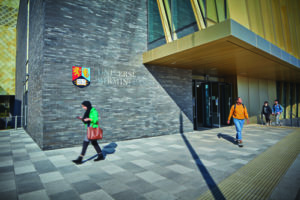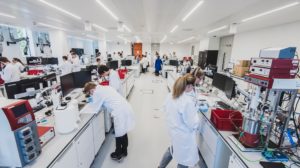A week in the life of a Chemistry student can be quite full-on – don’t sign up for a Chemistry degree for an easy ride! The material is challenging and there are lots of contact hours compared to most degrees. However, in some ways the intensity of the course carries you through it: it provides structure (especially for those who would struggle to be productive with lots of free days), it gets you out of your pyjamas every day and I think it makes for a tight-knit cohort. You see your course mates every day and so they quickly become a good source of support and laughter.

My timetable varies week on week, but the main impact on my timetable is whether or not I have labs. When I do have labs, they span two days (Monday and Tuesday) in the Collaborative Teaching Laboratory (CTL). The experiments aim to consolidate some of the theory learned in lectures by applying it in the lab. There is preparation to do before the lab (“pre-labs”) and a write-up to do afterwards (“post-labs”) – the latter involves recording and analysing your data. Labs are often long days and sometimes the experiments go awry, but they can also be rather fun and rewarding when you make your peace with them!

The remainder of the week is filled with lectures (three or four hours a day) and there’s often a tutorial and/or a piece of group work. There are always physical, organic and inorganic modules running alongside each other so there’s variety in the learning. Lecturers give out hand-outs to follow which is much better than having to furiously scribble down all of what they say. When I first started University, I found lectures quite exhausting in their intensity – lectures are more akin to downing a shot than sipping a long drink! The fast pace of learning took some getting used to – very different to secondary school where you might spend weeks on a single topic. When you get used to the pace though, it’s amazing how much you can cover in an hour’s lecture! In some ways, it feels like learning and loving the subject has only really begun at University and I find it a privilege to learn in such a deep and comprehensive way. In year 2 we have been given a choice over some optional modules: these modules are a gentle introduction to some interesting branches of Chemistry. I am particularly enjoying a biomineralisation course – the Chemistry really seems to come alive as we learn about the structure of jelly and the minerals in bones and sea urchins.
At the end of each module, there is usually a tutorial to work through and then go over with an academic in a group of about six. The tutorials can be challenging and take a long time to prepare for, but they are one of the best ways to learn and are a great opportunity to ask questions and iron out any queries. They are a bit daunting at first – I remember answering a question for the first time in a tutorial and feeling lots of eyes staring at me. The nice thing is that everyone is in the same boat though and I find that the best approach is to get stuck in and test your understanding, even if that involves asking the odd daft question!
